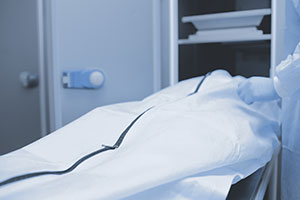The Pennsylvania Supreme Court has ruled that when autopsy reports are used to substantiate cause of death in murder cases, the medical examiner who wrote that report must testify in court.
The Shooting
In December 2012, Darnell Brown attended a party in Philadelphia after hiding a revolver in a nearby parked car. At the party, Brown got into an argument with Cory Morton. Brown’s friend, Marcus Stokes, retrieved the gun and gave it to Brown, who shot Morton four times.
Dr. Marlon Osbourne of the Philadelphia Medical Examiner’s Office performed an autopsy on Morton and prepared a report of his findings. The autopsy report detailed four gunshot wounds that struck the victim’s ribs, heart, left lung and left shoulder. The report noted that three bullets entered the front of the victim’s body and one entered his back. The report concluded that the cause of death was multiple gunshot wounds and that the manner of death was homicide.
Case History
When Brown’s case went to trial, Dr. Osbourne was no longer employed by the Medical Examiner’s Office and he was not called as a witness. His autopsy report was entered into evidence. The Commonwealth called a different medical examiner who had not been present at the autopsy to provide expert testimony based on portions of the autopsy report and photos.
Defense counsel objected to the admission of the autopsy report and medical examiner’s testimony, arguing that the report was testimonial evidence and its admission violated the Confrontation Clause of the Sixth Amendment of the United States Constitution. The trial court overruled the objection and Brown was convicted of third-degree murder and related offenses. Brown was sentenced to 25 to 50 years in prison.
Brown appealed, arguing that it was an error to let another medical examiner testify about the cause and manner of the victim’s death based on Dr. Osbourne’s autopsy report.
Commonwealth v. Brown
The Pennsylvania Supreme Court agreed with Brown that the autopsy report was testimonial. In the majority opinion, Justice Kevin Dougherty wrote that “the law requires the coroner or medical examiner charged with conducting and reporting the results of such autopsies to consult and advise the local district attorney to the extent practicable. . . . Accordingly, we determine the primary purpose for preparation of an autopsy report under these circumstances is to establish or prove past events potentially relevant to a later criminal prosecution and that any person creating the report would reasonably believe it would be available for use at a later criminal trial. Thus, we conclude the autopsy report in this case was testimonial.”
However, the court ruled that Osbourne’s absence was harmless. The majority explained that the report was inadmissible and that the medical examiner who testified based his testimony on other factors. “Here Dr. Chu formed an independent conclusion and testified to that conclusion based on his own review of both the otherwise inadmissible facts and data contained in the report and the data provided by the autopsy photographs. . . . Because Dr. Chu properly formed an independent opinion, and was available to be cross-examined regarding the basis of that opinion, we conclude there was no confrontation clause violation with respect to his opinion regarding the cause of death. Additionally, Dr. Chu’s testimony was sufficient to satisfy the commonwealth’s evidentiary burden regarding the victim’s cause of death.”




